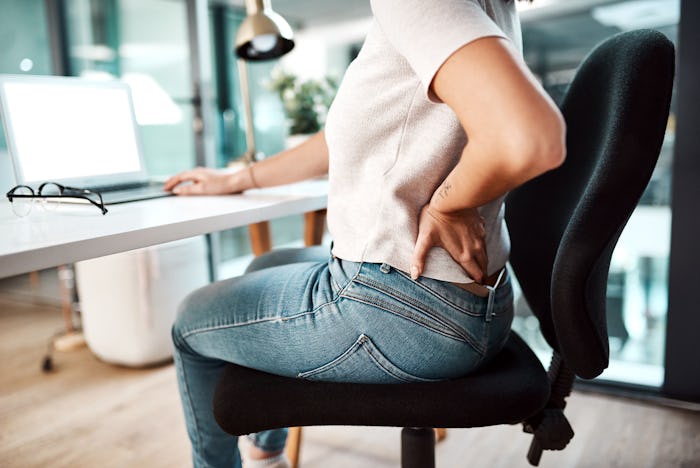Postpartum Life

What A Literal Pain In The Butt After Giving Birth Can Mean
There’s more than one cause...
I don't think there's a pregnant person out there who believes the immediate postpartum period is going to be a walk in the park. No matter how your little one comes into the world, there's going to be some... let's call it "pelvic disruption." But while your new baby's immediate exit is, reasonably, the area of chief concern, a lot of people aren't prepared for pressure in the bum after giving birth. No, literally, I'm talking about butt pain. But what does a pain in the butt after giving birth mean? Romper spoke with experts to find out.
If you think about it, the fact that someone might experience postpartum butt pain shouldn't be a terrific surprise. Have you ever seen a diagram of the pelvic floor? The butt is really super close to the epicenter of the birthing action. So it makes sense that one's tush can be affected by the whole rigmarole. Also, "butt" is pretty imprecise — there's not just one kind of butt pain that can occur as a result of childbirth.
Pressure in bum after birth could be due to pushing.
If you're experiencing tenderness in your bum, particularly if it's most noticeable when you're sitting or getting up from sitting, Dr. Daniel Roshan, director of Rosh Maternal-Fetal Medicine in Manhattan and assistant professor at NYU School of Medicine, says you can blame your tailbone. "Most pain in the butt area originates from the tailbone and it has to do with pushing in labor, [fetal] position, or epidural placement," he tells Romper. Roshan suggests that physical therapy, a comfortable mattress, exercises, back massage, and non-steroidal anti-inflammatory drugs such as Motrin are good remedies. He also warns that, "any ... pain that does not go away with these remedies requires medical attention." Your doctor my prescribe an x-ray or MRI in order to rule out the possibility of a fracture. (Which is rare, but does happen.)
Sharp pain in butt after birth could be anal fissures.
Other postpartum posterior pain can be less general.
I'm not going to be delicate here, people, I'm talking about the butthole — the rectum and anus can get banged up in the process of bringing a baby into the world. Dr. Elisa Birnbaum, who specializes in pelvic floor abnormalities and colon and rectal surgery at the University of Colorado Hospital, lists three main issues that can cause pressure in the bum after giving birth, discomfort, and/or pain postpartum: anal fissures, hemorrhoids, and infection related to tearing or an episiotomy.
Birnbaum tells Romper that anal fissures typically present as “acutely sharp pain which occurs during and after bowel movements” and are “usually caused by constipation, but straining during delivery may cause a tear." In addition to sharp internal pain, bright red blood may be a sign of anal fissures, either in the toilet or when you wipe. While certainly not pleasant, this problem can usually be managed with increased fluid to soften bowel movements — Birnbaum suggests increasing water intake to more than 10 glasses per day — and, if necessary, stool softeners or laxatives. It may take several weeks to resolve the issue. If pain persists beyond that, it's time to see the doctor. "There are prescription ointments and surgical procedures for management of fissures that don’t resolve with medical management," she says.
Hemorrhoids after birth are very common.
Birnbaum explains to Romper that these swollen veins in the lowest part of your rectum and anus causing pressure in your bum after giving birth can be either external (thrombosed) or internal (prolapsed) that come to the outside and don’t go back in. As with anal fissures, these bad boys can be caused by constipation or straining during delivery. They can also be caused by increased pelvic pressure during pregnancy (back when your baby was pressing down on everything). So if you're really #blessed, you've been dealing with hemorrhoids since before childbirth (which probably made them worse). What's to be done? "Treatment is the same as fissures to resolve the constipation [with] warm soaks for comfort," Birnbuam says. "If the swelling does not resolve or the pain is unbearable, a doctor might be able to excise the clot to relieve the swelling."
Infection after episiotomy could cause perineum pain.
A third source of pressure in the bum after giving birth, which Birnbaum says actually originates in the lower part of the vagina and perineum (read: the space between your vagina and anus that may well have taken a beating during childbirth), is infection from a tear. If you notice pain and swelling without a lot of blood along a tear or episiotomy repair, see your doctor right away. It may require antibiotics or drainage of the wound, Birnbaum says.
This all sounds very worrying and, yes, pretty gross, but here's an encouraging take-away: most of the literal pains in the butt or pressure in the bum you may experience after giving birth resolves itself pretty quickly. It's kind of like the infant stage: it feels like it takes forever and just might kill you, but all and all, it's actually quite fleeting.
This article was originally published on